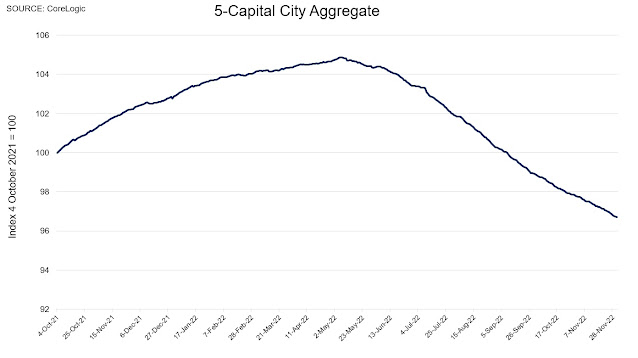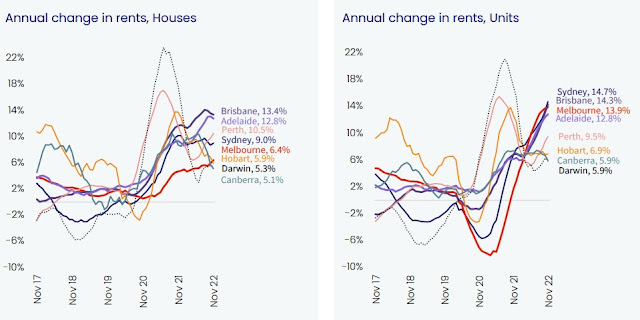Housing prices down
Dwelling prices declined a further -1 per cent in November to be -7 per cent below their peak, according to CoreLogic:
Source: CoreLogic
Some other indices are recording flat prices (or are even rising, in the case of asking prices), but CoreLogic continues to record declines, albeit at a somewhat slower pace since September.
Total listings are now well below their 5-year average, as fewer vendors look to list into the soft selling environment.
Source: CoreLogic
We're also heading for a chronic shortage of housing in Australia, accounting for why the downturn has been orderly - in most cases - rather than messy.
Rental markets remain "extremely tight" according to CoreLogic, with shrinking rental supply now met by a strong rebound in immigration, leading to a rapid rise in rents around the country.
Source: CoreLogic
I discussed in The New Daily here how the biggest price declines have often been seen in the areas which had the biggest pandemic booms.
Bad news is good news
The Aussie dollar romped back up to 68 US cents overnight, as the US Federal Reserve hinted at a slower pace of tightening ahead.
Australia's manufacturing PMI gauge slumped another -4.9 points to a reading of 44.7, which is significantly contractionary territory.
It doesn't feel like the Aussie economy needs more hikes, given how much the real time and forward-looking indicators are slowing already, though we'll probably get them anyway.
Australia's 3-year bond yield continued to plunge overnight, down to a fresh low of 3.08 per cent.
Greg Jericho explores whether inflation has peaked and the related implications in today's Guardian here.
---
In the US, futures markets are pricing for the Fed to keep hiking until February, before pausing, with rate cuts now priced in for late 2023 and through 2024.
Equities markets are enjoying this potential reprieve, and the S&P 500 recorded an increase of more than 5 per cent for the month of November (5.4 per cent), while the NASDAQ climbed 4.4 per cent overnight, have suffered some pounding losses through 2022.




